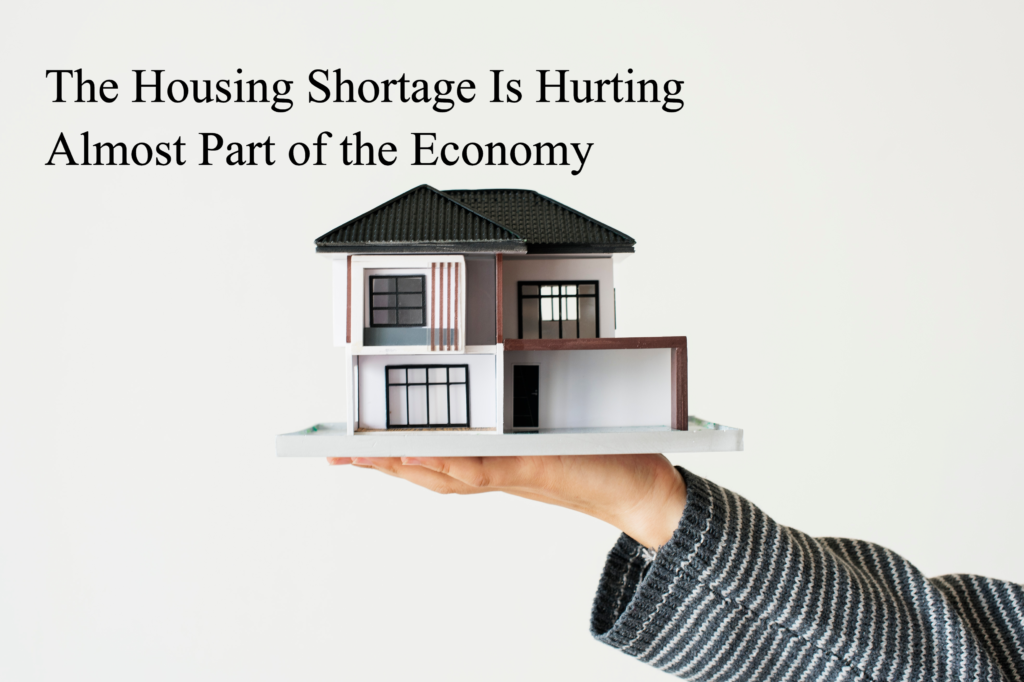
Introduction: The Housing Shortage Is Hurting Almost Part of the Economy
If you are looking The Housing Shortage Is Hurting Almost Part of the Economy . The lack of housing in the US has reached a crisis proportion that is affecting almost every aspect of the economy. Rising costs and sluggish wage growth are only two of the ways that this issue is harming people and businesses, as well as the economy as a whole. This article explores the various ways that the housing shortage is affecting society, emphasising the pressing need for all-encompassing solutions.
Housing Scarcity: A Problem Across the Country
There is an obvious discrepancy between the supply and demand for homes across the nation. The shortfall has been made worse by rapid population growth and a lack of building activity, which has driven up home prices beyond the means of many Americans. Consequently, the aspiration of becoming a homeowner has grown more elusive, especially for households with lower and moderate incomes.
The Effect of Ripples on Economic Growth
The lack of homes affects almost every area of the economy; it is not only a housing problem. Let’s investigate how:
1. Reduced Consumer Spending:
When housing costs take up a large amount of a consumer’s income, they have less money available to them to spend on other products and services. This decline in consumer spending hurts companies in a number of industries and slows down economic growth.
2. Challenges to the Labour Market:
Exorbitant housing expenses push workers to move to more inexpensive locations or put up with lengthy commutes, which throws off labour markets. Companies struggle to find and keep talent, which results in lower production and higher hiring costs.
3. Effect on Small enterprises:
The scarcity of housing has a significant negative impact on small enterprises, especially those in the retail and service industries. The reduction in discretionary spending among consumers as a result of housing costs has a direct effect on the profitability and revenue of small businesses.
4. Inequality and Social Strain:
Because low- and middle-income earners face a disproportionate amount of the housing expenditures, the housing crisis makes income inequality worse. Inequality like this promotes social discontent and erodes group togetherness, creating larger societal problems.
5. Financial Instability:
A key factor in overall financial stability is the property market. Overly high property prices increase the likelihood of a housing bubble and the ensuing market collapse, which may set off more widespread economic downturns.
Reactions and Solutions of Policy
A comprehensive strategy including communities, developers, and legislators is needed to address the housing shortfall. Here are a few possible fixes:
1. Boost Housing Supply:
By means of financial incentives and regulatory changes, promote and expedite the construction of affordable housing units. To encourage growth, municipalities might expedite the approval process and loosen zoning regulations.
2. Invest in Infrastructure:
Create thorough plans for infrastructure that will facilitate the development of homes in expanding metropolitan regions. Land can be made available for development and housing affordability can be increased by investments in utilities, public amenities, and transportation.
3. Encourage Mixed-Use Development:
In order to build thriving, walkable communities that seamlessly integrate residential, commercial, and recreational areas, embrace mixed-use zoning. In addition to maximising land use efficiency, this strategy promotes socioeconomic diversity.
4. Increase Access to Housing Assistance:
To support vulnerable populations, improve current housing assistance programmes and implement cutting-edge alternatives. This covers down payment aid, rental subsidies, and programmes for homeless people to live in supportive housing.
5. Promote Joint Ventures:
Work together with private sector partners to address the housing issue by utilising knowledge and resources. Innovative finance strategies and large-scale development projects can be supported via public-private partnerships.
In summary
The lack of housing is a structural problem that affects society, the economy, and people’s quality of life in general. It is not a singular issue. Through acknowledging the interdependence between housing and wider economic factors, decision-makers and interested parties can collaborate to develop long-term solutions that guarantee fair and inexpensive housing for all. It is imperative that we take action immediately to prevent the housing crisis from worsening its effects on nearly every aspect of the economy.
Frequently Asked Questions:
1. Why is there a dilemma with the lack of housing?
The growing disparity between supply and demand is the reason why the housing shortage has reached crisis proportions. Due to a lack of new activity and rapid population growth, home prices have increased, placing homeownership increasingly out of reach for many Americans.
2. What effect does the lack of housing have on consumer spending?
Exorbitant housing expenses cut into customers’ disposable income, which makes it harder for them to spend on other products and services. This decline in consumer spending stifles economic expansion and has a negative impact on companies in a number of industries, which eventually impedes the prosperity of the economy as a whole.
3. What effects does the lack of housing have on the labour market?
Because of the difficulties associated with lengthy commutes or moving to more affordable places, the housing shortage affects labour markets. Employers find it difficult to draw in and keep talent as a result of this phenomena, which raises recruitment expenses and reduces productivity.
4. In what ways does the scarcity of housing worsen the disparity in income?
The burden of rising housing expenses falls primarily on low- and middle-class earnings, aggravating income inequality. This might lead to social unrest and strained community cohesion, which would present more significant societal issues that need to be addressed and resolved.
